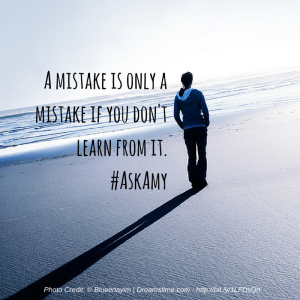#AskAmy
“Our 19-year-old son had a text conversation with a girl the other night. This girl is someone he has gone out with a few times and we have met her and spoken with her parents. Unfortunately, our son made the mistake of asking her some very personal and private questions of a sexual nature and her parents saw the request and called us! Needless to say, they were angry and we were shocked! We spoke with our son and he showed us the conversation (awkward) and said they just got a bit carried away on the texting. How do you think we should handle this major mistake with our son? – @momofthree

Hey, @momofthree, Things might really slow down for your son, I imagine, while each family takes stock of how to respond to this concern – and that sounds like it might be a good thing! Every teenager will goof up sometimes, make mistakes, act stupidly or perhaps try something, which will put him or her in real danger (or in your son’s case, deep doodoo).
And, as a responsible parent, it’s going to drive you crazy. When you find out what has occurred you will feel your blood pressure rise, you will want to scream (and possibly cry), and you will seriously wonder how badly you’ve failed as a parent.
But in most cases, what has happened isn’t about bad parenting or raising a really not-very-bright child. Rather, what you’re seeing is a teenager being a teenager. It’s a time when your teen, developmentally, is supposed to be moving away from your care and protection. It’s perfectly normal and it’s what we all want to have our children do successfully, unless you’re looking forward to your kid at 38-years-old living in your basement rent-free and playing Xbox 20 hours a day. And at 19 years old, having sexual desires is developmentally normal too!
While it’s important to recognize that it’s normal for your teen to be testing limits, it doesn’t mean you should have to look away when he or she makes a serious mistake. But rather than exploding (usually to a blank stare or that infamous “whatever” response) you can be much more effective by reacting calmly.
How? Start by not confronting your child when you are wild with anger (I have done that before and it doesn’t go well – trust me!). Instead, when you first see your child after whatever has happened, communicate calmly that you plan to discuss this situation later. Set a time to do so. Then take a walk or do something to relax and give yourself time to prepare your response thoughtfully, rather than emotionally.
When you’re calm, sit down at the appointed time and discuss what happened and why it troubles you. This is not a time for shouting or displays of violence. It’s a time to communicate rationally. Share your feelings with “I” statements, such as “I felt very angry and disappointed when I learned…” Explain as calmly as possible why what they did has upset or possibly scared you. And take this opportunity to communicate your family values about sex and appropriate relationship skills to your son.
A next step is to impose a meaningful and appropriate consequence. Don’t try and impose vague or endless punishments (“You’ll NEVER drive my car again!”), which clearly are not possible to meet. Instead, let the consequences show that you truly were disappointed and concerned, but that you want your child to know that once he or she pays the price for what happened, you’re confident future behavior will be more responsible.
Then…take a deep breath and know that parenting is like the game of “Wack-a-Mole” and just when you think you have one thing handled, another one pops right back up!
Be Wise!

Do you have a question for #AskAmy? Share it with us on Facebook or Twitter at WiseFamilies or email it to info@thewisefamily.com. Be sure to use the hashtag #AskAmy! Portions of the featured article courtesy of the American Counseling Association, www.counseling.org
A Wise Family resource: Great resource for ways to build resilience in children, teens and families! http://www.fosteringresilience.com/index_parents.php
“Dr. Amy brings together the best emotion-focused strategies with cutting-edge brain science to change the lives of children and families”
— Parent of adopted twin girls“Dr. Amy is like Oprah – she’s the neighbor you love who is very, very smart”
— Parent of 14-year-old son and 18-year-old daughter“Thank you so much for all you do and care for me. And all the work you do for my family. I {heart} you.”
— 10-year-old coaching client